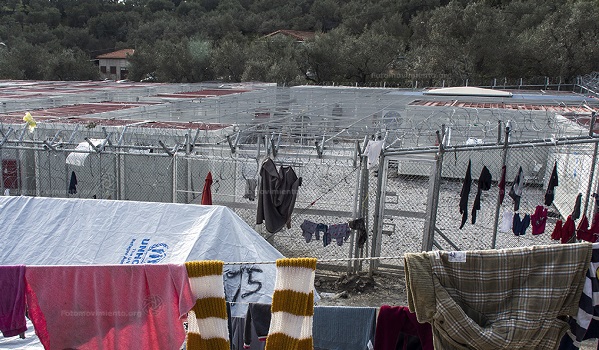The emergency suspension of asylum applications between 1 and 31 of March has ended and been replaced by a general suspension of activities of the Greek Asylum Service until at least April 10. The Malakasa camp, north of Athens has been quarantined due to a confirmed case of the COVID-19 virus. Luxembourg and Germany are the first of eight EU countries to make good on the promises to accept unaccompanied children from the island camps. Push backs by sea to Turkey reported in Evros.
The controversial emergency act suspending the submission of asylum applications for people arriving in the period between 1-31 March has ended. However, access to asylum has been affected by the suspension of the Greek Asylum Service’s activities due to COVID-19 measures, which will be in place at least until 10 April. The measure has affected every asylum applicant in Greece de facto preventing asylum applications.
Following similar measures in the Ritsona camp in central Greece where 20 people tested positive for the Corona virus the Malakasa camp north of Athens has now been quarantined. The measure follows a confirmed case of the Corona virus – an Afghan man aged 53 who has been transferred to a hospital in Athens. Countless civil society organisations and INGOs as well as MEP’s from the Committee on Civil Liberties, Justice and Home Affairs (LIBE) and EU commissioner for home affairs, Ylva Johansson, have called for the protection and support of refugees on the Greek mainland and in the overcrowded island camps.
Luxembourg and Germany are the first to deliver on promises made in March by eight European member states including also France, Portugal, Finland, Lithuania, Croatia and Ireland, later joined by Belgium, Bulgaria and Switzerland, to accept a total of 1600 unaccompanied children to be relocated from camps on the Greek islands. The German government has confirmed that it aims to begin the transfer of 50 children as a first step next week given concern for their health. Luxembourg is set to receive twelve unaccompanied children selected by UNHCR and facilitated by the UN migration agency, IOM. The Aegean islands hosts more than 42,000 people including about 5,500 unaccompanied children, ten per cent of whom are under the age of fourteen.
Media reports that Greek Coast Guard has been carrying out illegal returns of refugees by sea to Turkey. After reaching the Greek shore, people have reportedly been placed in rafts that look like floating tents and then left in Turkish territorial waters. Witnesses identified the people that previously arrived at the Greek shore and were later picked up in floating tents by the Turkish Coast Guard. Allegedly, at least nine such incidents were recorded on different Greek islands.
For further information:
- ECRE, Greece: Parliament Ratifies Emergency Decree Amid Intensifying Critique, March 2020
- ECRE, Greece: Fire and Virus Fear in Moria, 450 People Detained on Vessel Moved to Closed Camp, March 2020
- ECRE, Violations Continue in Greece, EU Says Asylum Procedures Cannot be Suspended, March 2020
- Organisations in Greece, Joint Statement: “Protect our laws and humanity!”, March 2020
- ECRE, Weekly Editorial: EU is Crossing the Red Line by Preventing Refugees from Crossing its Borders, March 2020
- ECRE, Greece: Situation in Lesvos Intensifies after Police Crackdown on Protesters, February 2020
- ECRE, Greece: Nationality-based Detention in the Moria Refugee Camp, January 2020
- ECRE, Serbia Shows European Solidarity in Greece – France Follows up on Mixed Promises, January 2019
- ECRE, Greece: Government Hit with Interim Measures and Introducing New List of Safe Country of Origin, January 2020
- AIDA, Country Report Greece, 2019 Update
- ECRE, France to Assist Greece Where Situation Continues to Worsen, December 2019
- ECRE, Greece: Six People Found Dead in Evros Region while Authorities Prop Up Border Security, December 2019
Photo: (CC) Fotomovimiento, January 2018
This article appeared in the ECRE Weekly Bulletin . You can subscribe to the Weekly Bulletin here.

